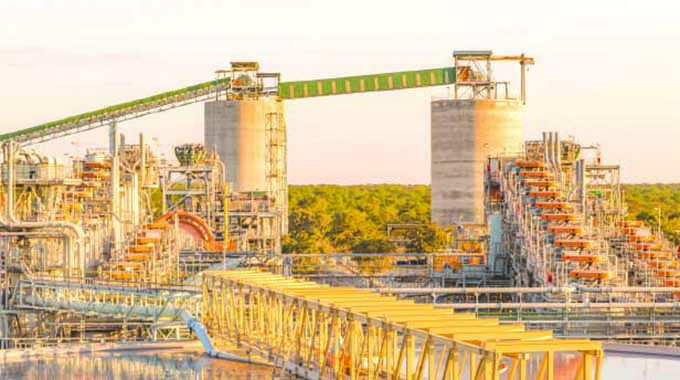Reviving and growing mining industry

Godknows Hofisi
Introduction
The mining industry in Zimbabwe presents significant opportunities for national growth and prosperity.
Government’s target to take the mining industry to US$12 billion per year by 2023 is noble and achievable in my view. Gold is expected to contribute US$4 billion and platinum US$3 billion per annum.
I recently read in The Herald Finance and Business that the Ministry of Mines and Mining Development was tasked to expedite the reopening of Kamativi Tin Mines and the Todal-Bokai Platinum Project.
This is very positive and well thought out.
National view
My view is that in addition to the mines that might be target for revival by Government, it is possible and worthwhile to have a national plan to revive and grow the mining sector in Zimbabwe in general if such plan does not already exist. All the key stakeholders can play key roles towards what I believe will be a national vision.
Taking stock
I know there is usually a lot of interest and excitement around gold mining and understandably so.
It is easy for gold miners to operate at different scales. The truth however, is that our country is endowed with various metals or minerals.
It is advisable to look across all minerals in the country and the mines that are involved in their mining and processing. This can be done mineral by mineral, region by region and come up with a comprehensive inventory of the mines.
Such data should also include the shareholders, state of the mine, challenges, creditors, revival or growth prospects, requirements for revival or growth, etc.
There is no doubt some of the common challenges include lack of adequate working capital and funding for the acquisition of mining equipment, the latter which need significant amounts of foreign currency to import.
The beauty about mining is that most produce, if not all, is exported and therefore earns foreign currency.
In my article of July 16, 2021 titled “About viability of mining sector” I explained that some of the factors influencing the viability of the mining sector in Zimbabwe include the following:
International metal or mineral prices.
Volumes produced or capacity utilisation.
Ore grade. Exchange control regulations including treatment of export proceeds. Exchange rates. Availability of foreign currency. Mining and administration costs. Fiscal policies ie taxes.
In order to come up with the comprehensive study or inventory, all key stakeholders should be involved. These include the Ministry of Mines and Mining Development, Ministry of Finance and Economic Development, Reserve Bank of Zimbabwe (RBZ), the Chamber of Mines of Zimbabwe, Fidelity Printers and Refiners, Minerals Marketing Corporation of Zimbabwe (MMCZ), Zimbabwe National Chamber of Commerce (ZNCC), Confederation of Zimbabwe Industries (CZI), associations of miners such as Zimbabwe Miners Federation, labour bodies, Master of the High Court of Zimbabwe, the Insolvency and Restructuring Association of Zimbabwe (IRAZ), bankers and many others.
There is no doubt in my mind that the Minister of Mines and Mining Development is well vested having come from the mining industry.
The Chamber of Mines is very vibrant and its leadership quite enthusiastic.
Revival plan
Having come up with the inventory or data on mines and industry, a revival plan can then be drawn up of which mines need special funding and capital equipment. A balance should be struck between small scale and large scale miners.
Government can facilitate funding for example by channelling affordable concessionary loans through banks to ensure they are eventually repaid. The RBZ may be key in co-ordinating funding working together with Government and banks.
Fidelity Printers and Refiners has in the past advanced very useful loans to gold miners and this has gone a long way in assisting the needy miners to boost their production. Banks on their own can structure mining specific funding that may include both foreign currency and local currency.
Use of turnaround specialists
Zimbabwe has diverse skills relevant to mining. These include mining professionals, business management executives, consultants, insolvency practitioners, bankers and others.
Insolvency practitioners through their association, IRAZ, come in the case of mines that are insolvent but can be revived.
These skilled practitioners can even be hired as mere consultants by mines that are not necessarily insolvent. Insolvent mines can be placed under corporate rescue proceedings and be managed by corporate rescue practitioners and benefit from the protection afforded by the law in terms of the Insolvency Act (Chapter 6:07).
The Master of the High Court of Zimbabwe can also assist as to which practitioners can be useful in the revival effort.
Implementation
Planning is not an end in itself. It needs implementation for success to be attained. Desired results are achieved through implementation. Effective implementation of even 50 percent of the plans will take the mining sector and the nation to another level never seen before.
Unfortunately effective implementation is difficult, the subject of another future article.
There might be merit in setting up a national taskforce to drive the revival and growth plan led by the Ministry of Mines.
Benefits of reviving mining
I opine that Zimbabwe is driven by agriculture and mining. Reviving and growing mining has many benefits such as increased foreign currency earnings and employment creation.
There will be spill over benefits to other industries that do business with mining.
Conclusion
It can be done. A national mining industry revival and growth plan plus effective implementation will bring about the desired results to take mining to another level.
Disclaimer
This simplified article is for general information purposes only and does not constitute the writer’s professional advice.
Godknows (GK) Hofisi, LLB(UNISA), B.Acc(UZ), CA(Z), MBA(EBS,UK) is a legal practitioner / conveyancer, chartered accountant, corporate rescue practitioner, registered tax accountant and consultant in deal structuring and is an experienced director of companies. He writes in his personal capacity. He can be contacted on +263 772 246 900 or [email protected]










Comments